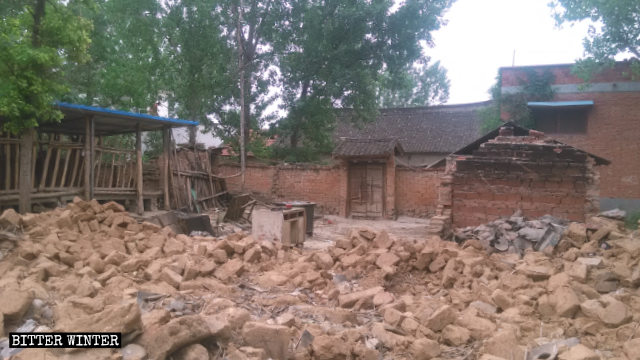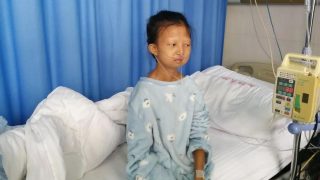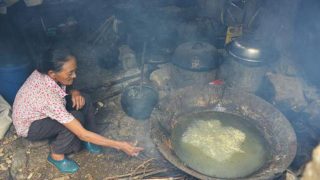Table of Contents
As the deadline “to lift all impoverished households out of poverty by 2020” is approaching, the CCP is hailing its “great achievements.” People see it differently.
by Tang Zhe
Put forward in 2015, President Xi Jinping’s poverty alleviation policy was supposed to lift 70 million impoverished households out of poverty by 2020, vowing to “leave no one behind in the march toward common prosperity.” After nearly five years, as the deadline is drawing closer, China’s state-run media has been praising “the amazing poverty alleviation accomplishments,” claiming that “China has made remarkable achievements in alleviating the historical and international headache of poverty, which earns her worldwide focus and praises from foreign media.”
Is this really the case?


“The CCP is lying to the people, and only those involved know the real story,” a farmer who has been “lifted out of poverty” told Bitter Winter.
Poverty alleviation makes the impoverished poorer
A man in his late forties has been disabled since childhood, and he also suffers from various other illnesses. To make a living and support his elderly parents and young children, he started a small online business. His entire family relies on the limited earnings he makes and a monthly subsidy of 250 RMB (about $ 36) from the government. This is less than enough, and the man feels suffocated by the heavy burden of continuous hardship.
The family’s prospects are looking even bleaker in 2020 when the nationwide poverty alleviation program is going to be finished; allegedly, because it would have achieved its goal. The family will lose even the small amount from the government, regardless that they had not become “moderately prosperous,” as promised when the policy was started in 2015.
“According to the policy, our country will have eradicated poverty by 2020, and we will be ‘a moderately prosperous county,’” a village official explained to the family on October 24. “In seven months, your subsistence allowance will be canceled. It’s the same all over the country. There will be no impoverished households or households in need of subsistence allowance.”
“Once the subsistence allowance is canceled next year, what will we live on? The government wants to have a good reputation, but pays no heed to the life of ordinary people,” the man complained.
Village officials showed him a list of all the aid his family receives from the government: the yearly subsistence allowance, disability payments, and financial assistance for his two children they receive at school. Since all these subsidies are more than 3,700 RMB (about $ 527) per year for each family member, this means that his family had been lifted out of poverty, the officials claimed, giving him a paper to sign that he had understood their explanation.
Forced to overstate earnings
In response to Xi Jinping’s call, local governments across China use all possible means to reach the goals of “Two No-Worries and Three Guarantees”: impoverished families have sufficient food and clothing – the two “no-worries” – and are provided with “three guarantees” of compulsory education, basic medical care, and safe housing. In many cases, however, lies and overstatements about poverty alleviation achievements have been used to make shortcuts in meeting the goal by 2020.
A couple in a village administered by Heze city in the eastern province of Shandong live on the meager income from two mu (approximately 0.33 acre) of farmland. The husband is sick and is unable to take care of himself. The wife is receiving 500 RMB (about $ 71) in benefits, but the official who was assigned to cover the village told her to overstate her family overcome, to say that they earned 10,000 (about $ 1,426) each year. “There are no impoverished households now. It’s not allowed to report an income of less than 10,000 RMB,” the official explained.
“We never had this much money but were told to report it. It is the same as the ‘wild exaggerations,’” the wife complained, referring to Mao Zedong’s Great Leap Forward campaign (1958-1960) that was supposed to help China “surpass England and America.” During that time, officials at all levels were lying about grain outputs to pursue high standards, resulting in great exaggerations of reality.


The woman had to do as told, because “the CCP only gives money to those who are obedient,” the official declared. He also threatened to cancel her subsistence allowance if she refused to cooperate.
Poverty alleviation causes suffering
Already in 2017, some experts started expressing concerns that Xi Jinping’s poverty alleviation plan was more about making headlines than bringing lasting change to poor communities.
It has become a norm across China for local governments to create an illusion that poverty had been alleviated to pass through inspections from the higher-ups. Quite often, the result is more poverty, human tragedies, and even lost lives.
On July 11 this year, officials ordered a 72-year-old villager from Yugan county’s Jiulong town, administered by Shangrao city in the southeastern province of Jiangxi, to relocate. The reason? The elderly man belonged to an impoverished household and lived in a shabby house, which was considered “a stain on the good results of poverty alleviation.” The man was unwilling to move out, but officials harassed him three times, threatening to make his life miserable. The man went to live with his son.


An elderly woman in the area told Bitter Winter that in February, her terracotta-roofed home was sealed off before it was forcibly demolished. Township officials said to her that the demolition was done to accomplish poverty alleviation, claiming that “impoverished households are not allowed to live in houses with terracotta roofs, only in storied buildings.”
According to the woman, the government toppled down four houses in the village. Five households were pressured to demolish their homes themselves. All in the name of poverty alleviation.


On November 19, a 72-year-old man in Henan’s Xiangcheng city killed himself by hanging in desperation after the government forcibly demolished his house.
A villager recalled that, before committing suicide, the elderly man was shouting in agony to an official, “You demolished my house, how can I survive? Aren’t you forcing me to a dead end?”









